The demand for Cloud ELN (Electronic Lab Notebooks) services in Japan is projected to grow from USD 17.1 million in 2025 to USD 42.1 million by 2035, reflecting a CAGR of 9.5%. Cloud ELN services are increasingly being adopted in research and development settings, particularly in industries such as pharmaceuticals, biotechnology, and academic research. These platforms offer enhanced data management, collaboration, and security capabilities, allowing researchers to store and share their data digitally in compliance with regulatory requirements. The need for real-time collaboration, remote access, and advanced data analytics across R&D teams drives the demand for cloud-based ELN solutions.
As Japan continues to expand its R&D investments and enhance its digital infrastructure, demand for cloud-based solutions such as ELN will grow steadily. Technological advancements in data security, cloud computing, and AI-driven analytics will further support the market's expansion. Additionally, as laboratories and research organizations increasingly migrate to digital environments, the need for efficient, scalable, and compliant electronic notebook services will continue to rise, creating a positive growth trajectory for the market over the next decade.
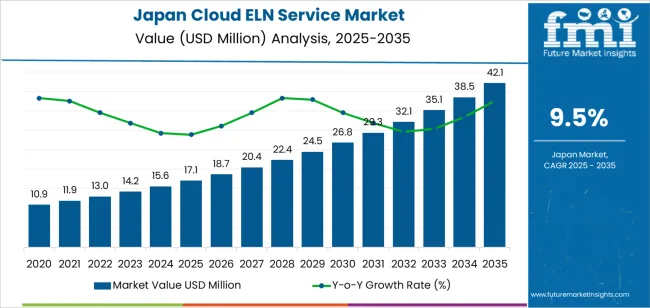
The breakpoint analysis for cloud ELN services in Japan reveals key moments when the market experiences significant shifts in growth, primarily driven by technological advancements and industry adoption.
From 2025 to 2030, the demand will grow from USD 17.1 million to USD 26.8 million, contributing USD 9.7 million in value. The early phase will experience an acceleration in growth, driven by the adoption of cloud-based solutions in research environments, especially in pharmaceutical, biotech, and academia. This growth is expected to come from the early-stage adoption of ELN systems as companies recognize the benefits of real-time data sharing, remote collaboration, and compliance with regulatory standards. The breakpoint during this period will likely occur around 2028, when more industries and institutions transition from traditional paper-based systems to fully digitalized workflows, significantly boosting market demand.
From 2030 to 2035, the market will grow from USD 26.8 million to USD 42.1 million, contributing USD 15.3 million in value. This phase will see stronger demand, but with a slower acceleration as the market matures. The breakpoint in this phase will occur as the market reaches a stage of wider adoption, with large-scale research institutions and corporate R&D departments increasingly integrating cloud ELN solutions into their operations.
The shift from early adoption to mainstream usage will bring stable growth, with larger institutions making system-wide transitions, driven by the need for enhanced data security, compliance, and collaborative efficiency. Despite a slight deceleration in the growth rate, the demand for cloud ELN services will continue to rise steadily as more industries implement digital solutions for their research data management.
| Metric | Value |
|---|---|
| Industry Sales Value (2025) | USD 17.1 million |
| Industry Forecast Value (2035) | USD 42.1 million |
| Industry Forecast CAGR (2025-2035) | 9.5% |
Demand for cloud electronic laboratory notebook (ELN) services in Japan is increasing as research organisations, pharmaceutical companies, biotechnology firms and chemical manufacturers adopt digital solutions to manage experimental data more efficiently. Japanese labs are shifting away from paper and on premises systems to cloud based platforms because these offer real time collaboration, audit trails, regulatory compliance and integration with instruments. The emphasis on innovation in Japanese life sciences, materials and chemical sectors supports this transition.
Another critical driver is Japan’s growing interest in agile R&D operations and digital transformation of laboratories. Features such as remote access, version control, data security and scalability appeal to institutions facing pressures to accelerate development, manage intellectual property and comply with global standards. However, growth can be moderated by concerns over data sovereignty, integration with legacy systems and cost of implementation in established facilities. Despite these challenges, the convergence of research intensity, regulatory standards and technology readiness suggests that demand for cloud ELN services in Japan will continue to grow steadily.
The demand for Cloud Electronic Lab Notebooks (ELN) services in Japan is primarily driven by component and deployment type. The leading component is software, holding 65% of the market share, while hybrid cloud is the dominant deployment method, capturing 54.7% of the demand. Cloud ELN services are essential for enhancing data management, collaboration, and research processes in various industries such as pharmaceuticals, biotechnology, and research institutions. The increasing need for secure, scalable, and efficient data management solutions drives the adoption of cloud-based ELN platforms in Japan.
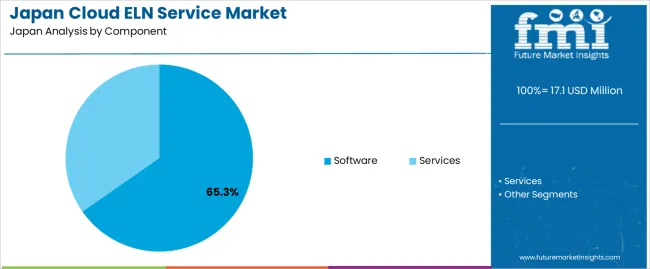
Software leads the Cloud ELN service market in Japan, accounting for 65% of the demand. The software component of Cloud ELN services plays a critical role in enabling researchers and institutions to digitally record, store, and manage experimental data, facilitating collaboration and data sharing in real-time. The demand for ELN software is driven by the need for more efficient, organized, and secure data management solutions that replace traditional paper-based lab notebooks.
The popularity of ELN software is also supported by its ability to integrate with other laboratory tools and systems, streamlining workflows and ensuring compliance with industry regulations. As research institutions and laboratories increasingly adopt digital technologies, the need for reliable and user-friendly software solutions grows, solidifying software as the leading component in the Cloud ELN market in Japan. With the continued push for digital transformation in research, the demand for cloud ELN software is expected to remain strong.
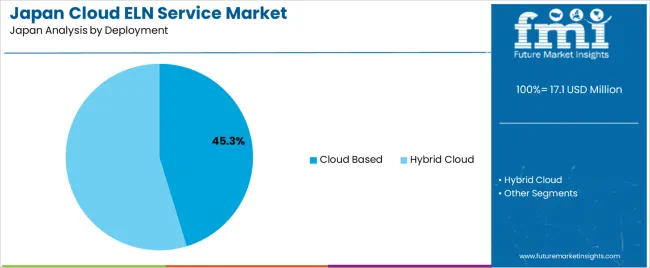
Hybrid cloud is the leading deployment method for Cloud ELN services in Japan, capturing 54.7% of the demand. Hybrid cloud deployment combines both on-premises and cloud-based solutions, providing organizations with the flexibility to store sensitive data on private servers while utilizing the scalability and accessibility of public cloud services for less critical data. This deployment model allows for better control, security, and compliance, which is essential in industries such as pharmaceuticals and biotechnology, where data privacy is a key concern.
The demand for hybrid cloud solutions is driven by the need for secure, scalable, and flexible data management systems that can handle large volumes of research data. By leveraging both private and public cloud resources, hybrid cloud deployment offers organizations the best of both worlds ensuring data security and compliance while benefiting from the cloud's cost-effectiveness and scalability. As more organizations in Japan move toward cloud-based solutions, the hybrid cloud deployment model is expected to continue to dominate the Cloud ELN market.
Demand for cloud based electronic laboratory notebook (ELN) services in Japan is rising as research and development operations across life sciences, chemicals and academia pursue digitalisation, remote collaboration and regulatory compliance. Japanese organisations are increasingly adopting cloud solutions to support experiment documentation, data sharing, version control and audit trails. At the same time, slower growth in traditional laboratory investment, data sovereignty and security concerns and high local integration costs moderate growth. Together, these factors shape the demand environment for Cloud ELN services in Japan.
Several factors support growth. First, increasing R&D spending in pharmaceuticals, biotechnology and materials science in Japan creates need for digital lab tools that improve productivity and compliance. Second, the shift to cloud infrastructure and remote work in research labs enhances demand for ELNs that provide collaborative, web based access and centralised experiment records. Third, regulatory mandates and internal quality management programs in Japanese labs require audit ready documentation, versioning and traceability that cloud ELNs deliver. Fourth, the rising use of partnerships, multi site trials and global data capture encourages adoption of standardised electronic lab notebooks instead of disparate paper logs.
Despite positive drivers, growth is constrained by several factors. High costs of implementation, customisation, integration with existing laboratory information management systems (LIMS) and instrument interfaces can deter smaller labs. Data security and cloud data sovereignty concerns among Japanese organisations may slow migration from on premise to cloud deployment. The market for basic paper based or on premise ELNs remains significant, limiting full transition. Also, changing workflows and training requirements for lab staff may pose adoption barriers in traditional Japanese laboratory environments.
Important trends include increased deployment of global cloud ELN platforms with Japanese language support and local data‐centres to address data sovereignty concerns. There is growing integration of ELNs with AI based analytics, lab instrumentation and workflows to support test protocols, collaboration and data reuse. The move toward hybrid cloud models where sensitive data remains local while standard experiment records are hosted in the cloud is gaining traction. Additionally, adoption is expanding beyond large pharmaceutical firms to academic research institutes, startups and contract research organisations in Japan implementing cloud ELNs as part of broader lab digitalisation efforts.
The demand for Cloud Electronic Lab Notebooks (ELN) services in Japan is growing as industries like pharmaceuticals, biotechnology, and research institutions continue to embrace digital transformation in their research and development processes. Cloud ELNs enable scientists and researchers to securely store, manage, and share data and experimental results in a collaborative environment, improving productivity and compliance with regulatory standards.
The shift toward digital solutions, the increasing need for data security, and the rising demand for collaboration tools in research-driven industries are key factors driving the adoption of Cloud ELNs. Regional differences in demand are influenced by factors such as the concentration of research and development centers, technology infrastructure, and the degree of digital adoption across Japan. Below is an analysis of the demand for Cloud ELN services across different regions of Japan.
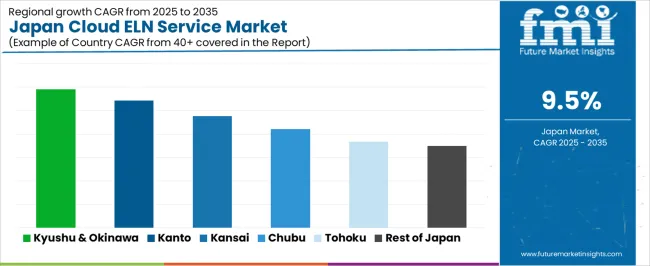
| Region | CAGR (2025-2035) |
|---|---|
| Kyushu & Okinawa | 11.8% |
| Kanto | 10.9% |
| Kinki | 9.5% |
| Chubu | 8.4% |
| Tohoku | 7.4% |
| Rest of Japan | 7% |
Kyushu & Okinawa leads the demand for Cloud ELN services in Japan with a CAGR of 11.8%. The region’s growing focus on the biotechnology and pharmaceutical industries contributes significantly to the increasing adoption of digital lab tools such as ELNs. Kyushu, in particular, has a strong presence of academic institutions, research centers, and companies focused on innovation in life sciences, all of which require efficient data management and collaboration solutions.
As Japan’s research community embraces digital solutions, Kyushu & Okinawa's emphasis on technological adoption and infrastructure development has made it a key market for Cloud ELN services. The region's rising number of collaborative research initiatives and regulatory requirements for secure data storage further drives the need for cloud-based laboratory management systems. Kyushu & Okinawa’s commitment to fostering growth in science and technology supports the region's high growth in Cloud ELN adoption.
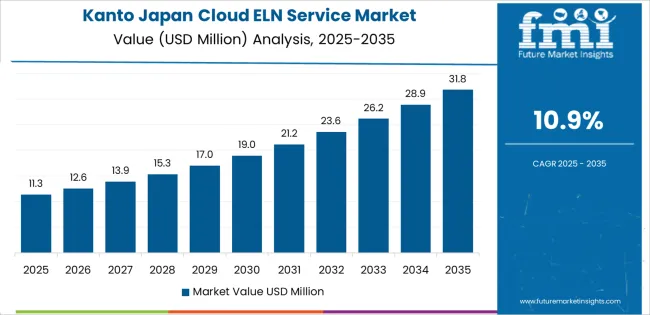
Kanto shows strong demand for Cloud ELN services with a CAGR of 10.9%. As Japan’s primary economic and technological hub, Kanto, which includes Tokyo, is home to a large concentration of pharmaceutical companies, research institutions, and academic centers. These organizations are increasingly adopting digital tools for research and collaboration, making Cloud ELNs a critical part of their operations.
The demand in Kanto is driven by the region’s advanced healthcare and research infrastructure, which fosters innovation and data-driven collaboration in sectors like pharmaceuticals, biotechnology, and academic research. The region’s emphasis on regulatory compliance and the need for secure, efficient, and scalable data management systems further supports the growth of Cloud ELNs. As Kanto continues to lead in research and technological development, its demand for Cloud ELN services remains strong.
Kinki, with a CAGR of 9.5%, shows steady demand for Cloud ELN services. The region includes major industrial centers like Osaka and Kyoto, which are home to numerous pharmaceutical companies, research laboratories, and universities. The growing adoption of digital tools for data management and collaboration in these sectors is driving demand for Cloud ELNs.
While the growth rate in Kinki is slightly lower than in Kyushu & Okinawa and Kanto, the region’s strong industrial base and focus on technological advancement continue to support a steady increase in Cloud ELN usage. As businesses in Kinki seek to improve research productivity and meet regulatory standards, the demand for digital solutions like Cloud ELNs is expected to grow steadily.
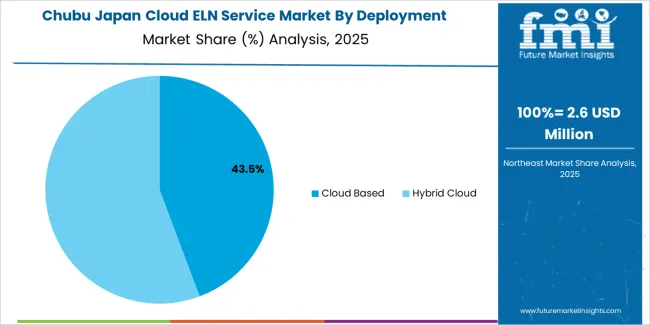
Chubu demonstrates moderate growth in the demand for Cloud ELN services with a CAGR of 8.4%. The region is known for its automotive and manufacturing industries, but it also has a growing presence of pharmaceutical and research institutions. As these sectors increasingly adopt digital solutions to enhance research and data management capabilities, the demand for Cloud ELN services is steadily rising.
Although the region's growth rate is slower compared to other areas like Kyushu & Okinawa and Kanto, Chubu's expanding focus on technology adoption and innovation in research-driven industries will continue to contribute to a gradual increase in Cloud ELN usage. The region’s investment in digital infrastructure and the rising need for secure and efficient data management solutions support the ongoing adoption of Cloud ELNs.
Tohoku, with a CAGR of 7.4%, and the Rest of Japan, with a CAGR of 7.0%, show slower growth in the demand for Cloud ELN services. These regions are more rural and less industrialized compared to more tech-driven areas like Kanto and Kyushu & Okinawa. While there are research institutions and smaller companies adopting digital tools, the rate of digital transformation is not as advanced as in urban regions.
The demand in these regions is supported by growing academic and research initiatives, particularly in universities and smaller research centers. However, the slower growth in these regions can be attributed to fewer large-scale pharmaceutical and biotechnology companies, which are the primary drivers of Cloud ELN adoption. As digital adoption in research and healthcare sectors continues to grow, these regions will likely see gradual but steady increases in Cloud ELN usage.
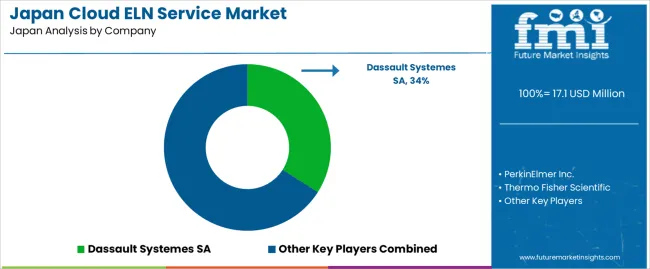
The demand for Cloud ELN (Electronic Laboratory Notebook) services in Japan is growing as the country’s research and pharmaceutical sectors increasingly transition to digital platforms to enhance data management, improve collaboration, and streamline research processes. Companies like Dassault Systemes SA (holding approximately 34% market share), PerkinElmer Inc., Thermo Fisher Scientific, Agilent Technologies Inc., and Bruker Corporation are key players in this market. Cloud-based ELN solutions are becoming essential for managing experimental data, ensuring regulatory compliance, and fostering collaboration across research teams, particularly as Japan’s life sciences and chemical industries continue to expand their digital capabilities.
Competition in the Cloud ELN service industry is driven by features such as ease of use, data security, regulatory compliance, and integration capabilities with other laboratory tools and systems. Companies are focusing on providing ELN platforms that support multiple types of research workflows, including chemical, biological, and material science research, while offering a seamless user experience. Another area of competition is the ability to offer customizable features, such as real-time collaboration, data storage, and analysis tools, which are essential for research teams working remotely or across multiple locations.
Companies also emphasize their platforms’ ability to comply with strict regulations such as GLP (Good Laboratory Practice) and FDA 21 CFR Part 11. Marketing materials often highlight security features, integration with existing lab instruments, and scalability. By aligning their services with the growing demand for efficient, compliant, and collaborative research environments, these companies aim to strengthen their position in the Cloud ELN service market in Japan.
| Items | Details |
|---|---|
| Quantitative Units | USD Million |
| Regions Covered | Japan |
| Component | Software, Services |
| Deployment | Cloud Based, Hybrid Cloud |
| Enterprise Size | Small Offices (1-9 employees), Small Enterprises (10-99 employees), Medium-sized Enterprise (100-499 employees), Large Enterprises (500-999 employees), Very Large Enterprises (1,000+ employees) |
| Industry | Enterprises/Corporates, Event Management Agencies, Academic Institutions, Trade Show Organizers, Others |
| Key Companies Profiled | Dassault Systemes SA, PerkinElmer Inc., Thermo Fisher Scientific, Agilent Technologies Inc., Bruker Corporation |
| Additional Attributes | The market analysis includes dollar sales by component, deployment model, enterprise size, and industry categories. It also covers regional demand trends in Japan, particularly driven by the growing need for cloud-based ELN (Electronic Lab Notebook) services in various industries, including academic institutions and enterprises. The competitive landscape highlights key players focusing on innovations in ELN software and service offerings. Trends in the increasing adoption of cloud and hybrid cloud solutions for research and data management, along with advancements in cloud ELN functionalities, are explored. |
The global demand for cloud ELN service in Japan is estimated to be valued at USD 17.1 million in 2025.
The demand for cloud ELN service in Japan is projected to reach USD 42.1 million by 2035.
The demand for cloud ELN service in Japan is expected to grow at a 9.5% CAGR between 2025 and 2035.
The key product types are software and services.
In terms of deployment, the cloud-based segment is expected to command 45.3% in 2025.






Our Research Products

The "Full Research Suite" delivers actionable market intel, deep dives on markets or technologies, so clients act faster, cut risk, and unlock growth.

The Leaderboard benchmarks and ranks top vendors, classifying them as Established Leaders, Leading Challengers, or Disruptors & Challengers.

Locates where complements amplify value and substitutes erode it, forecasting net impact by horizon

We deliver granular, decision-grade intel: market sizing, 5-year forecasts, pricing, adoption, usage, revenue, and operational KPIs—plus competitor tracking, regulation, and value chains—across 60 countries broadly.

Spot the shifts before they hit your P&L. We track inflection points, adoption curves, pricing moves, and ecosystem plays to show where demand is heading, why it is changing, and what to do next across high-growth markets and disruptive tech

Real-time reads of user behavior. We track shifting priorities, perceptions of today’s and next-gen services, and provider experience, then pace how fast tech moves from trial to adoption, blending buyer, consumer, and channel inputs with social signals (#WhySwitch, #UX).

Partner with our analyst team to build a custom report designed around your business priorities. From analysing market trends to assessing competitors or crafting bespoke datasets, we tailor insights to your needs.
Supplier Intelligence
Discovery & Profiling
Capacity & Footprint
Performance & Risk
Compliance & Governance
Commercial Readiness
Who Supplies Whom
Scorecards & Shortlists
Playbooks & Docs
Category Intelligence
Definition & Scope
Demand & Use Cases
Cost Drivers
Market Structure
Supply Chain Map
Trade & Policy
Operating Norms
Deliverables
Buyer Intelligence
Account Basics
Spend & Scope
Procurement Model
Vendor Requirements
Terms & Policies
Entry Strategy
Pain Points & Triggers
Outputs
Pricing Analysis
Benchmarks
Trends
Should-Cost
Indexation
Landed Cost
Commercial Terms
Deliverables
Brand Analysis
Positioning & Value Prop
Share & Presence
Customer Evidence
Go-to-Market
Digital & Reputation
Compliance & Trust
KPIs & Gaps
Outputs
Full Research Suite comprises of:
Market outlook & trends analysis
Interviews & case studies
Strategic recommendations
Vendor profiles & capabilities analysis
5-year forecasts
8 regions and 60+ country-level data splits
Market segment data splits
12 months of continuous data updates
DELIVERED AS:
PDF EXCEL ONLINE
Demand Signal Repository Solutions Market Size and Share Forecast Outlook 2025 to 2035
Demand Side Management Market Size and Share Forecast Outlook 2025 to 2035
Demand Response Market Analysis - Size, Share, and Forecast Outlook 2025 to 2035
North America Shipping Supplies Market Trends – Innovations & Growth 2024-2034
Demand of Kozani Saffron in Greece Analysis - Size, Share & Forecast 2025 to 2035
Demand of No-acid Whey Strained Dairy Processing Concepts in European Union Size and Share Forecast Outlook 2025 to 2035
Demand for Bronte Pistachio in Italy Analysis - Size, Share & Forecast 2025 to 2035
Demand and Trend Analysis of Gaming Monitor in Western Europe Size and Share Forecast Outlook 2025 to 2035
Demand and Trend Analysis of Gaming Monitor in Korea Size and Share Forecast Outlook 2025 to 2035
Demand and Trend Analysis of Gaming Monitor in Japan Size and Share Forecast Outlook 2025 to 2035
Glycine Soja (Soybean) Seed Extract Market Size and Share Forecast Outlook 2025 to 2035
Demand and Trend Analysis of Yeast in Japan - Size, Share, and Forecast Outlook 2025 to 2035
Demand of Pistachio-based desserts & ingredients in France Analysis - Size, Share & Forecast 2025 to 2035
Western Europe Men’s Skincare Market Analysis – Forecast 2023-2033
Demand and Trends Analysis of Stevia in Japan Size and Share Forecast Outlook 2025 to 2035
Japan Women’s Intimate Care Market Trends – Growth & Forecast 2024-2034
Demand and Trend Analysis of Fabric Stain Remover in Korea Size and Share Forecast Outlook 2025 to 2035
Demand and Sales Analysis of Paper Cup in Korea Size and Share Forecast Outlook 2025 to 2035
Demand and Sales Analysis of Paper Cup in Western Europe Size and Share Forecast Outlook 2025 to 2035
Demand of MFGM-enriched Powders & RTDs in European Union Size and Share Forecast Outlook 2025 to 2035

Thank you!
You will receive an email from our Business Development Manager. Please be sure to check your SPAM/JUNK folder too.
Chat With
MaRIA